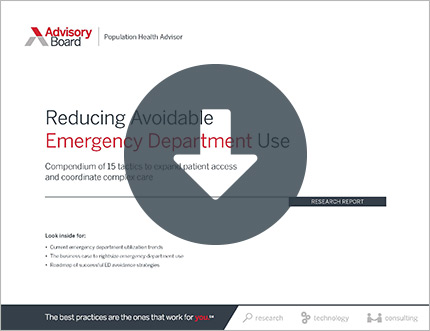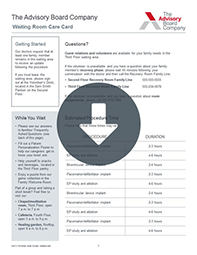Auto logout in seconds.
Continue LogoutGrandview Medical Center in Ohio has implemented a team triage model for its ED that has cut ED wait times and reduced the number of patients who leave without being seen by a provider, Christopher Cheney writes for HealthLeaders Media.
Learn key tactics to improve urgent care—and keep your cancer patients out of the ED
How the model works
According to Nikole Funk, medical director at Grandview, the hospital is a "high-volume, inner-city hospital" that previously had only one triage nurse. Previously, Funk said, "the process was to triage one patient at a time, then send patients to the back if a bed was available." The process took five to seven minutes per patient, "so if you have three patients check in, you can fall 21 minutes behind," Funk said.
To speed up the process, Grandview adopted a team approach to triage, creating a provider-in-triage team that consists of a physician and two nurses.
Grandview also created a designated waiting area, results called the "results-pending area," for patients who were waiting for lab work and other test results. Dawn Sweet, clinical nurse manager at Grandview, said that prior to implementation of the new system, low-acuity patients often would get tired of waiting and leave from the waiting room, even if they were awaiting results of lab or radiological tests.
Positive results
So far, the model has produced positive results, Cheney writes. Since the provider-in-triage model was introduced in July 2017, the percentage of patients seen by a doctor within 10 minutes has increased from 38% to 71%.
Funk said the hospital has also benefited financially. The rate of patients leaving without being seen by a provider has fallen from about 1.8%-2.2% to 1.1%. "Financially, you are capturing all of those patients," Funk said.
According to Sweet, other hospitals that have adopted provider-in-triage models have seen the rate of patients leaving against medical advice rise. But at Grandview patients leaving against medical advice has dropped to about 1%. "With our facility, both numbers went down," said Sweet. "With our process, we have been able to retain nearly all of our patients through the full length of their care. They are not waiting as long for tests and results."
The decreased wait times have also led to an increase in patient volume as word of mouth is spreading throughout the community, Funk said. "We have had people come in and say 'We hear that you don't have a long wait [time] here.' That also increases your revenue," she said (Cheney, HealthLeaders Media, 5/17).
Improve patient experience with our customizable ED waiting room card
It’s tough to balance provider productivity and patient-centeredness, and the waiting room is one frequently overlooked opportunity to find equilibrium. By explaining what to expect during procedures, you can neutralize a major source of family anxiety and questions.
We've made it easy. Use our template to create a "waiting room care card" that addresses key family questions. Just drop in your logo and add your institution’s protocols. Save, print, and start improving your waiting room experience.
Don't miss out on the latest Advisory Board insights
Create your free account to access 1 resource, including the latest research and webinars.
Want access without creating an account?
You have 1 free members-only resource remaining this month.
1 free members-only resources remaining
1 free members-only resources remaining
You've reached your limit of free insights
Become a member to access all of Advisory Board's resources, events, and experts
Never miss out on the latest innovative health care content tailored to you.
Benefits include:
You've reached your limit of free insights
Become a member to access all of Advisory Board's resources, events, and experts
Never miss out on the latest innovative health care content tailored to you.
Benefits include:
This content is available through your Curated Research partnership with Advisory Board. Click on ‘view this resource’ to read the full piece
Email ask@advisory.com to learn more
Click on ‘Become a Member’ to learn about the benefits of a Full-Access partnership with Advisory Board
Never miss out on the latest innovative health care content tailored to you.
Benefits Include:
This is for members only. Learn more.
Click on ‘Become a Member’ to learn about the benefits of a Full-Access partnership with Advisory Board
Never miss out on the latest innovative health care content tailored to you.


